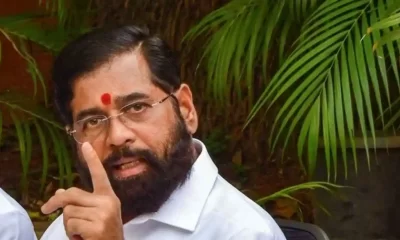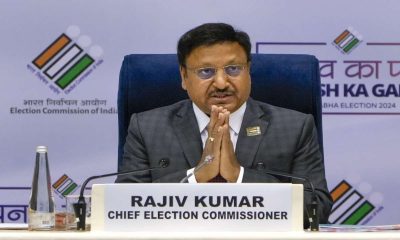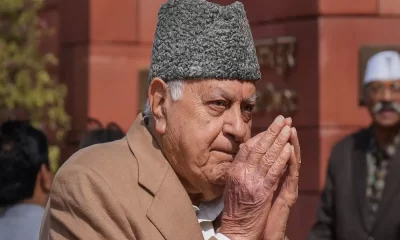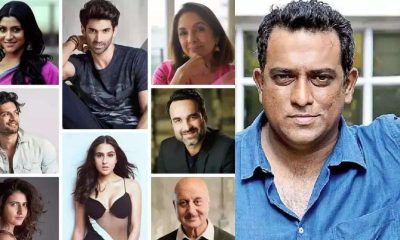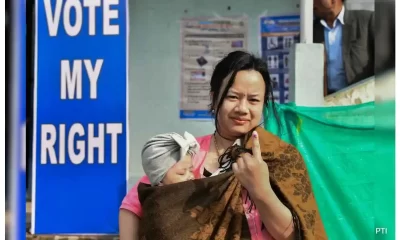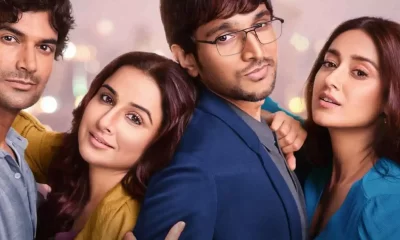India News
The Best Prime Minister the Congress Never Had
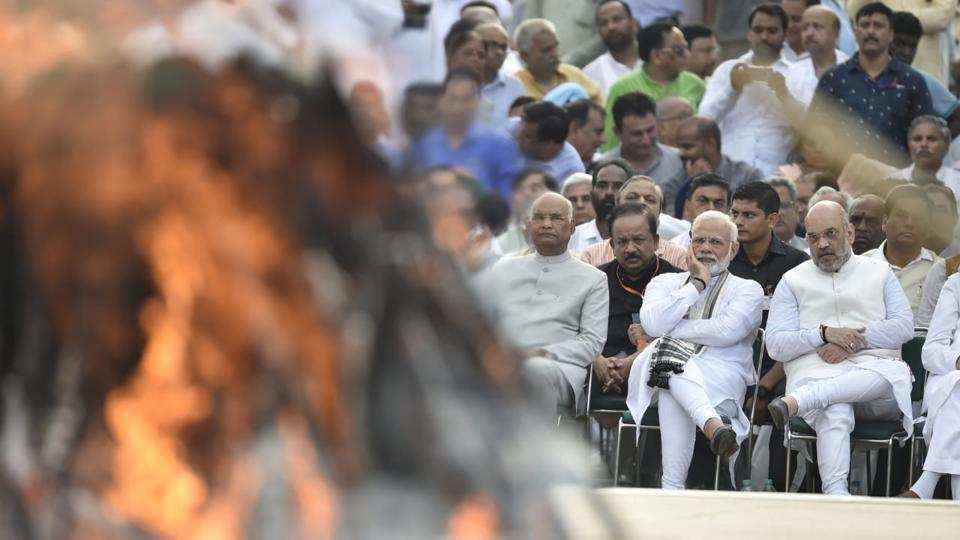
~By Saeed Naqvi
Aaney wali naslein hum par
Fakhr kareingi, hum asaro,
Jub unko yeh khayal aayega
Humney Atal ko dekha thaa
(By way of poetic license I have replaced Firaq with Atal)
“Coming generations will remember us with awe,
When it dawns on them that we had actually seen Atal Bihari Vajpayee”
I can claim a little more. I knew him. I say so with utmost modesty because there were many journalists who knew him better. But he had a knack of making a chosen few feel special with a smile here and gesture there. Confronting him was always a renewal because your opening question was generally greeted with stony silence, bordering on lack of recognition. Then would come a well thought through response to a question asked five minutes ago. There was no unprocessed response.
Exuberance was not his style but when moved by an idea, he could be demonstrative as at the Hyderabad House banquet when he put his arms around me. “Mainey aap ka lekh parha; kaee baar parha. Maen aapse sahmat hoon.” (read your column several times; I agree with you.)
It was not just a Prime Ministerial approval of a column but the warmth with which the appreciation was communicated. It would have been most unlike him to react to a dry piece on foreign affairs or national politics. What moved the sentimental lyricist in him wa a taboo I had broken by placing Hindu-Muslim issues in a context readers were unfamiliar with.
Communal riots had broken in Moradabad in 1982. I was Regional Editor for The Indian Express with headquarters in Chennai. Nihal Singh, the Editor-in-chief, asked me to “churn out” an edit on Moradabad.
Instead of writing something in a jiffy, I fell back on nostalgia, my life in my village, the cultural commerce which has held society together for hundreds of years. The new political class has taken its eyes off it largely because harmony does not easily translate into votes. In my piece, I listed Mohsin Kakorwi invoking images associated with Krishna to celebrate Prophet Mohammad’s birthday; Maulana Hasrat Mohani’s adoration for Krishna and Radha, in verse and gesture.
“Ahelia, who had turned to stone because of a curse, was restored to her former self by Your touch. From the animal kingdom You elevated an army worthy of Hanuman’s leadership.
Your reformed a wicked Chandal. “O’Lord Rama, when will You cast your benign eye on me?”
This is from the Sanskrit poetry of Abdul Rahim Khan-I-Khana, one of Akbar’s courtiers.
The list is unending, particularly if you dilate on Hindu poets writing in a similar vein since the 17th century atleast. The latest Noha or a dirge for Moharram is:
“Kaash Hindustan mein hota janam Abbas ka,
Barh ke hum Hindu utha letey alam Abbas ka”
(We wish Imam Hussain’s brave brother, Abbas, was born in Hindustan.
Because when the enemy cut off his arms in battle, we Hindus would have raised his banner.)
No, I have not veered far away from Atalji. In fact I am sharing with you a slice of social history in which he was involved.
The late H.R. Malkani, editor of the RSS mouthpiece, Organiser, was the first to write to me. “I salute you” he wrote, “Your piece brought tears into my eyes.” An interview was arranged with RSS ideologue Bhaurao Deoras. Malkani invited me to 10, Ashok Road, for tea with Atalji who was shaking his head in admiration. (Link to the piece http://naqvijournal.blogspot.com/2018/08/in-aftermath-of-moradabad-riots.html)
This gushing of admiration from the parivar was unnerving. Had I by writing one column unintentionally turned my back on my progressive friends? Had I opened myself to the charge of walking the illiberal path? But everybody, and his neighbour, from the Congress to the far left swear by our composite culture, Ganga-Jumni tehzeeb and so on. Do they like the concept only in its haziest outlines? Does the idea get tainted if the Parivar finds it wholesome?
Authors like M. Mujeeb who in his masterly survey, Indian Muslims, has left no aspect of syncretism untouched. But the large body of liberal, Muslim Intelligentsia, scholars, seminarists, writers, columnists had before 1982 chosen to ignore evidence of syncretism strewn all over, the Sufi belief system that Rama and Krishna were God’s prophets sent to India. This the liberal Muslims thought would expose them to the charge of “shirk” or apostasy among the wider, community. The Mullah, unencumbered by such considerations pushed his agenda diligently and with a sense of purpose. The results are there for all to see.
Vajpayee, familiar with Lucknow, grasped the significance of Indian syncretism. But the practical politician in him also saw the liberal Muslim’s hesitations. Not only does he have limited votes he is also intellectually uncertain. Vajpayee had a singular advantage over his peers: he was the most respected member of the Sangh and yet he had evolved along the path of modernism. He slid out of his RSS coil with deliberation; he did not shuffle out of it. If my mother’s test for dependability were applied to Vajpayee, he would emerge with flying colours. “Always mistrust a man without an obvious weakness” she used to say. As he came out of the RSS shadows, the romantic in Vajpayee was given measured play. He loved the good things of life. Heaven knows where he had developed a taste for fried prawns?
Towards the end of 2003 he made up his mind to resolve “regional quarrels”. Ofcourse, losing the 2004 election was a huge setback. But what rankled with him was the Pakistan, Kashmir imbroglio: a solution along the line of control was almost within grasp according his Principal Secretary, Brajesh Mishra.
Did Vajpayee have a model? K.K. Katyal of The Hindu, myself and one or two others trailed him on the first day he entered his South Block office when he was appointed the Minister for External Affairs in the Janata government led by Morarji Desai in 1977.
We asked him how he felt occupying his first office in South Block? He summoned up the poet in him. Misty eyed, he said he had difficulty controlling his emotions. “I cannot believe that I am about to occupy the chair which was once occupied by Pandit Jawaharlal Nehru.”
2024 Lok Sabha Elections
Lok Sabha Elections 2024: Nearly 40% voter turnout till 1pm
Chennai recorded an average voter turnout of 34% as of 1 pm on Friday. According data released by the Election Commission of India, Chennai (North) recorded 35%, Chennai (Central) recorded 32.3% and Chennai (South) recorded 34%.
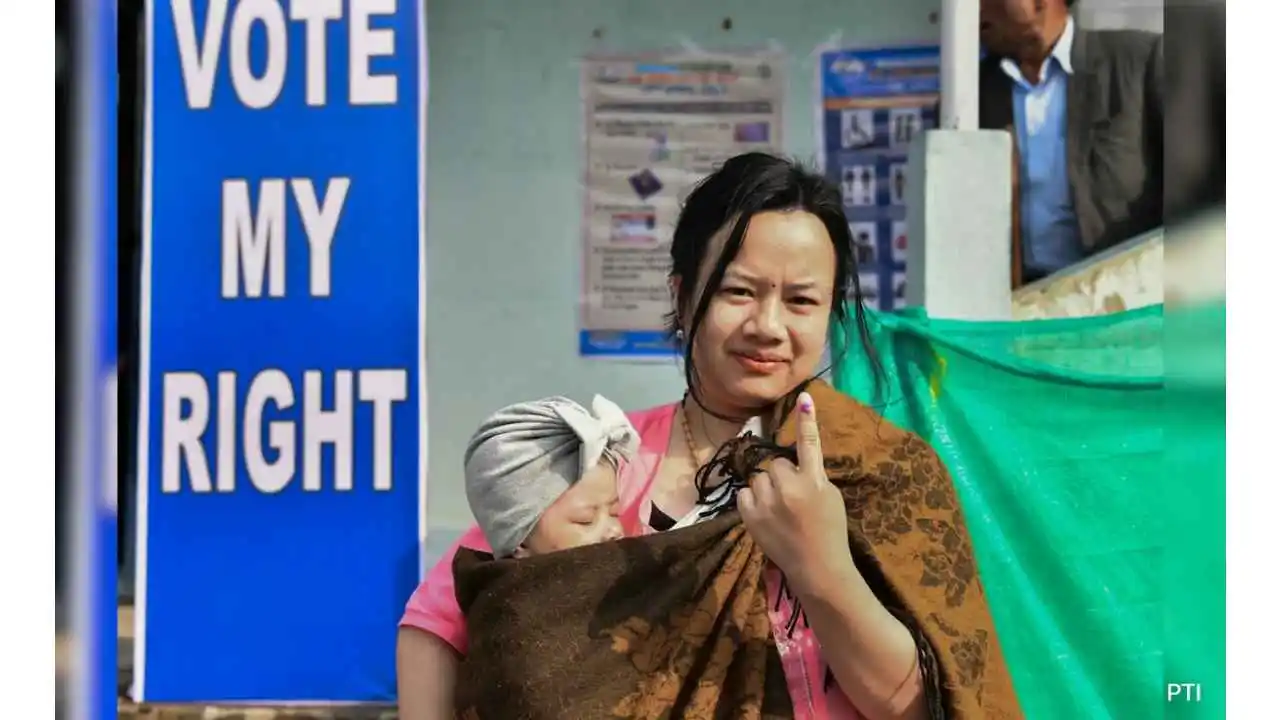
The first phase of voting for the 18th Lok Sabha elections started taking place in 21 states and Union territories on Friday. Nearly 40% voter turnout was recorded till 1pm across the states. Seats in Assam, Arunachal Pradesh, Chhattisgarh, Bihar, Maharashtra, Madhya Pradesh, Manipur, Mizoram, Meghalaya, Rajasthan, Nagaland, Tamil Nadu, Sikkim, Uttar Pradesh, Tripura, West Bengal, Uttarakhand, Jammu and Kashmir, Andaman and Nicobar Islands, Lakshadweep and Puducherry go to elections on Friday.
There has been a substantial increase in the voter turnout charts across the Northeast states, with Tripura leading at 53.04% until 1 pm, as per the data released by the Election Commission of India. Other northeast states like Manipur (46.92%) and Meghalaya (48.91%) are also witnessing high voter turnout. After Tripura, West Bengal is experiencing a high voter turnout of 50.96%.
Chennai recorded an average voter turnout of 34% as of 1 pm on Friday. According data released by the Election Commission of India, Chennai (North) recorded 35%, Chennai (Central) recorded 32.3% and Chennai (South) recorded 34%.
Over 33% voter turnout was recorded in the first 6 hours of voting on Friday in 12 parliamentary constituencies of Rajasthan. According to the Election Commission, voting started at 7 am amid tight security arrangements and 33.73 % voting took place till 1 pm. The highest voter turnout of 40.72 % was recorded in the Ganganagar Lok Sabha seat while Karauli-Dholpur saw the lowest turnout of 28.32 %. Jaipur recorded a poll percentage of 39.35 %.
Over 37 % voter turnout was recorded till 1 pm in the Lok Sabha election being held for five parliamentary constituencies in Uttarakhand on Friday. Elections began at 7 am and the five constituencies recorded an overall poll percentage of 37.33 % up to 1 pm. The Nainital-Udham Singh Nagar seat recorded the highest turnout of 40.46 %, followed by Haridwar with 39.41%, Pauri Garhwal with 36.60 %, Tehri Garhwal with 35.29 % and Almora with 32.29 %.
2024 Lok Sabha Elections
Lok Sabha elections 2024: Amit Shah files nomination from Gandhinagar
The Union Home Minister Amit Shah was accompanied by Gujarat CM Bhupendra Patel.
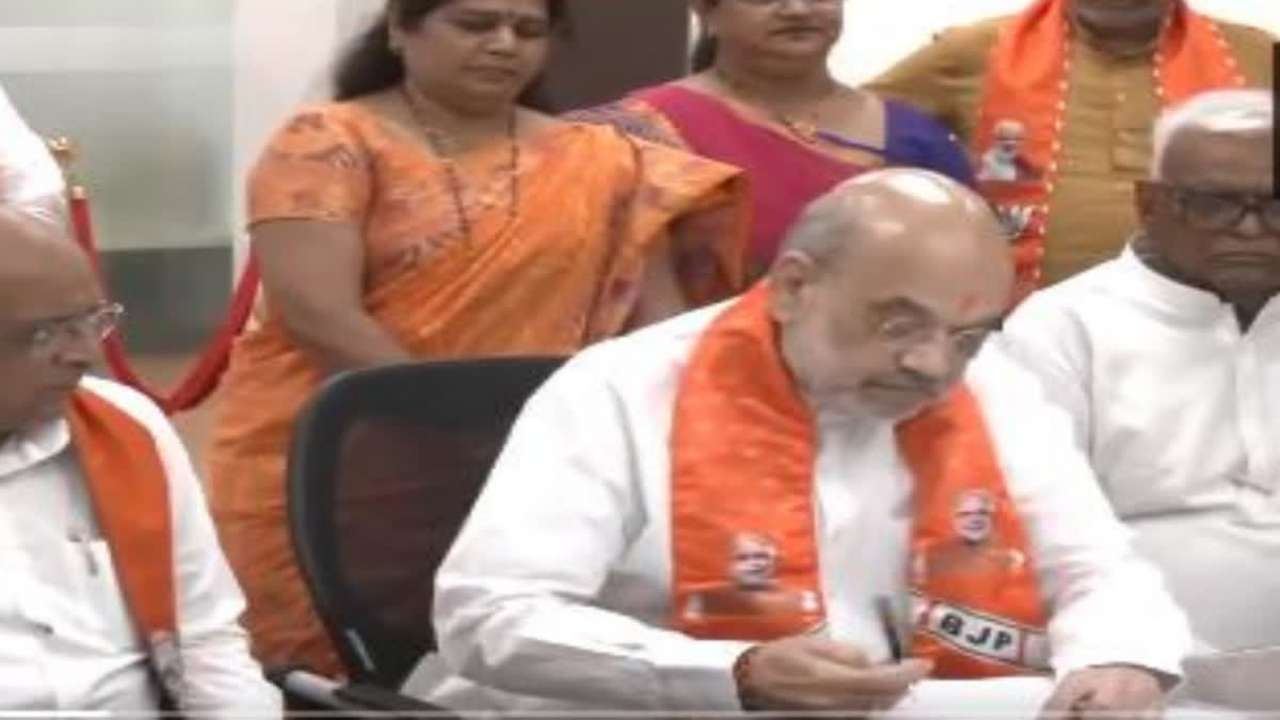
Ahead of the upcoming general elections, the Union Home Minister Amit Shah submitted his nomination today from Gandhinagar Lok Sabha constituency. During his nomination, Gujarat Chief Minister Bhuperndra Patel accompained him.
Former deputy prime minister and BJP chief LK Advani, who earlier served as a representative of this seat during Shah’s successful run for re-election.
Soon after filing nomination, Shah said, today he has submitted his nomination from the Gandhinagar seat. He said it is a matter of pride for him that this seat was represented by the former Prime Minister Atal Bihari Vajpayee, LK Advani and the seat where Narendra Modi himself is a voter. He also said he has been an MLA and MP from this seat for 30 years. The people of this region have given him immense love, Shah said.
With an astounding vote share of 69.67 percent in the 2019 Lok Sabha elections, Shah maintained the BJP’s stronghold in Gandhinagar with a resounding victory. Election turnout has been consistently high in the city.
In 1984–85, Amit Shah joined the BJP. His political skills and organizational prowess were recognized, and he soon became the national treasurer of the Bhartiya Janata Yuva Morcha.
Amit Shah’s political career took a significant turn in 1991.
Shah became the national president of the BJP in 2014, and he was promoted to the position of Home Minister five years later.
In the context of Indian politics, Gandhinagar is a historical landmark. The former prime minister Atal Bihari Vajpayee, won seats from Gandhinagar and Lucknow in the 1996 Lok Sabha elections. However, he decided to stay to his Lucknow seat, opening the door for other leaders to set their mark in Gandhinagar.
Meanwhile, Congress has fielded its party secretary Sonal Patel from Gandhinagar.
Gujarat is scheduled to go for a single phase of elections on May 7. The results of the election will be announced on June 4.
2024 Lok Sabha Elections
Tamil Nadu BJP chief K Annamalai says party will sweep Karnataka and emerge victorious in Telangana, accuses DMK, AIADMK of influencing voters in Coimbatore
Annamalai expressed his confidence of a historic result for the NDA on June 4, the IPS officer-turned-politician said the BJP will see a rise in its vote share in Tamil Nadu
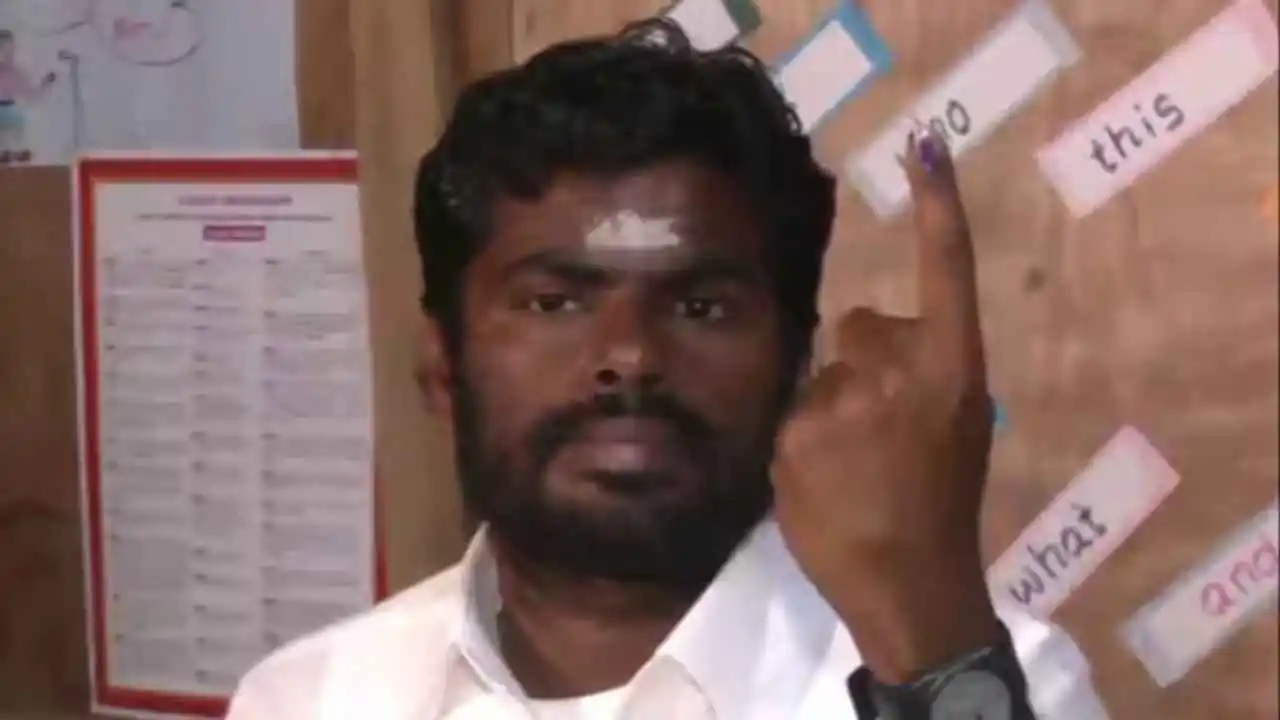
Tamil Nadu BJP chief and party candidate from Coimbatore seat K Annamalai said the time of Dravidian politics is over and also accused the ruling DMK and AIADMK of spending Rs 1,000 crore in Coimbatore to influence voters. Annamalai made the statement after casting his vote at Uthupatti polling booth in Karur village on Friday.
He expressed his confidence of a historic result for the NDA on June 4, the IPS officer-turned-politician said the BJP will see a rise in its vote share in Tamil Nadu. Annamalai further added people of Tamil Nadu are with Prime Minister Narendra Modi.
He said in the state of Karnataka the party is expecting a clean sweep this time. The State BJP chief said the BJP will be the number 1 party in Telangana. He said he was confident that Tamil Nadu will deliver a very big resounding result this time. He said there will be a rise in BJP’s vote share in the state and time of Dravidian politics is over.
In Coimbatore, K Annamalai is contesting the election from Coimbatore and is facing DMK’s Ganapathy P Rajkumar and AIADMK’s Singai Ramachandran. All 39 seats in Tamil Nadu will go for voting in the first phase. K Annamalai spoke to the media after casting his vote and accused the ruling DMK and AIADMK of spending more than Rs 1,000 crore in Coimbatore to influence the voters.
He said if the ruling DMK and AIADMK can bring 1 voter in front of the media to say that BJP is trying to influence them, then he will leave politics the same day because he is running in this election as a matter of principle. The elections to the state of Tamil Nadu will be closely monitored as the state has been at the centre of the BJP’s southern push in order to realise Prime Minister Narendra Modi’s 400 paar goal.
-
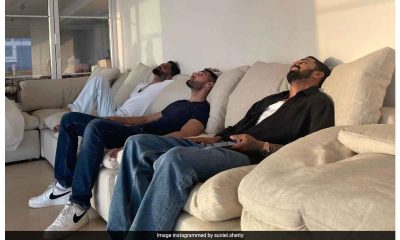
 Cricket news24 hours ago
Cricket news24 hours agoHappy Birthday KL Rahul: Suniel Shetty wishes son-in-law KL Rahul on his 32nd birthday
-
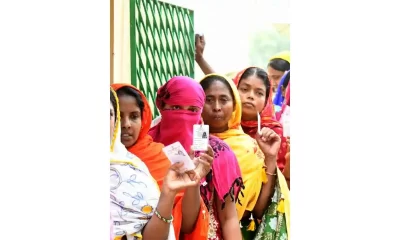
 2024 Lok Sabha Elections7 hours ago
2024 Lok Sabha Elections7 hours agoPrime Minister Narendra Modi urges citizens to vote in record numbers as voting for first phase of Lok Sabha elections begins on 102 seats across India
-
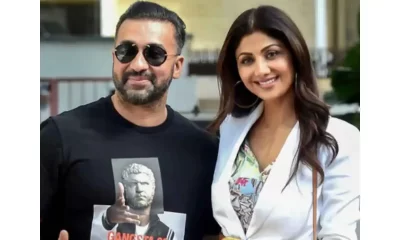
 India News23 hours ago
India News23 hours agoEnforcement Directorate seizes Shilpa Shetty’s husband Raj Kundra’s properties worth Rs 97 crore
-
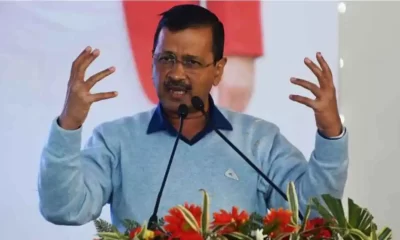
 India News21 hours ago
India News21 hours agoEnforcement Directorate says Arvind Kejriwal is deliberately eating mangoes, sweets, taking sugar with tea to increase his blood sugar level and create ground for bail
-
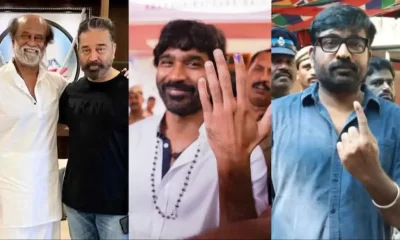
 2024 Lok Sabha Elections5 hours ago
2024 Lok Sabha Elections5 hours agoKamal Haasan, Rajinikanth, Vijay Sethupathi, Dhanush vote in Chennai
-

 2024 Lok Sabha Elections6 hours ago
2024 Lok Sabha Elections6 hours agoLok Sabha elections 2024: Google Doodle marks the start of polls with index finger voting symbol
-
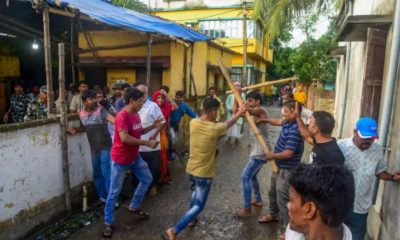
 2024 Lok Sabha Elections5 hours ago
2024 Lok Sabha Elections5 hours agoLok Sabha elections 2024: TMC, BJP workers clash in West Bengal’s Cooh Behar ahead of voting
-
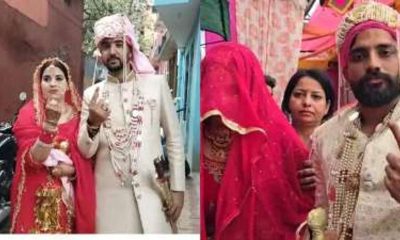
 2024 Lok Sabha Elections4 hours ago
2024 Lok Sabha Elections4 hours agoLok Sabha elections 2024: Newly married couple cast vote in Jammu and Kashmir’s Udhampur, video goes viral




